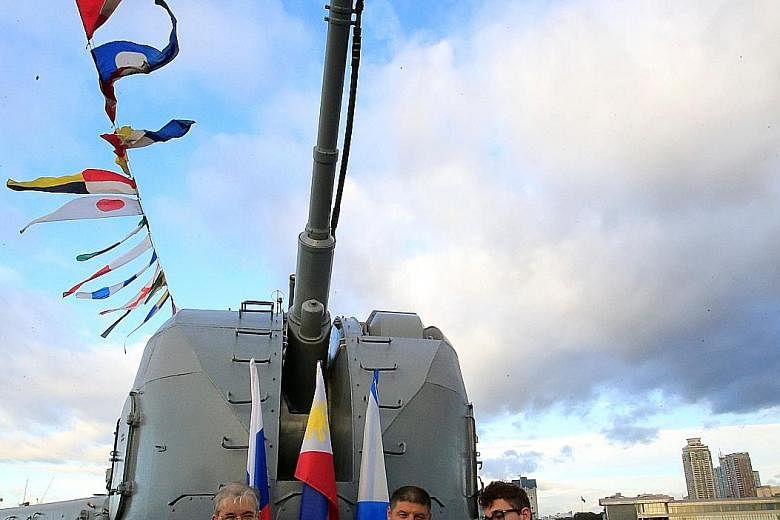The Philippines is taking the right steps in diversifying its alliances, Russia's ambassador to Manila said yesterday as he pushed for defence cooperation, short of a military alliance, between the two countries.
"I think it's time to get rid of outdated cliches… The period of political or military monopoly is over," Mr Igor Anatolyevich Khovaev said during a news conference on board the anti-submarine destroyer, Admiral Tributs, which docked in Manila on Monday for a goodwill visit.
The destroyer was escorted by the sea tanker Boris Butoma. The two ships will leave on Saturday.
"As far as I understand, for the Philippines, there is an objective need to diversify the range of the circle of your foreign partners," said Mr Khovaev.
He clarified that Moscow is not pushing Manila to end its decades- long ties with Washington, Russia's traditional rival.
"Diversification means keeping traditional, old partners and getting new ones. Russia is ready to become a new, reliable partner and close friend of the Philippines."
Russia is "now taking necessary efforts… for military cooperation", including a "solid legal basis" for joint exercises, Mr Khovaev said.
But the ambassador stressed that Russia is not seeking a "military alliance" with the Philippines.
"On principle, we are against any close military alliances in the Asia-Pacific region because the security must be equal for all members of the international community, not only for a select few.
"There is no need to talk about any special status for armed forces. It's not on the agenda."
The Philippines has a mutual defence treaty, inked in 1951, with the United States. The two nations are also bound by various security pacts that have allowed US forces to use Philippine military bases as staging areas for their operations in the Asia-Pacific, including freedom of navigation exercises and air patrols meant to check China's expansion in the South China Sea.
Mr Khovaev said Russia is looking at defence arrangements meant to help the Philippines deal with terrorists, drug traffickers and pirates.
"No one is able to cope, struggle effectively against terrorism, extremism, piracy, drug trafficking alone… That's why joint military exercises are very necessary to develop these forms of bilateral cooperation as much as possible," he said.
Russia is also ready to provide the Philippines with submarines, fighter aircraft, helicopters and assault rifles, among other weapons.
"Sophisticated weapons. Not the second-hand ones," he said.
President Rodrigo Duterte has turned to China and Russia for weapons as lawmakers in the US block arms deals and aid to the Philippines over thousands of extrajudicial killings that have blighted his war on crime since he took office last June 30.
He sent Defence Secretary Delfin Lorenzana to Moscow in November to look at the weapons Russia is offering. Mr Lorenzana said the Russians offered a submarine, but Manila was keen on drones, sniper rifles and small arms instead.
Mr Duterte has eschewed large military purchases, calling the squadron of FA-50 multirole fighters the Philippine Air Force recently acquired from South Korea "flashy" purchases that are of little tactical value in fighting terrorists holed up in mountain hideouts.

